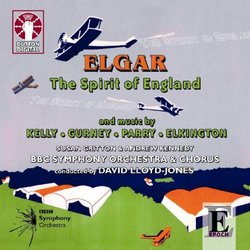LAST NIGHT OF THE POMS
DAVID BRYSON | Glossop Derbyshire England | 03/20/2007
(5 out of 5 stars)
"90 years after the events of WW1 is probably rather a good time to choose for dusting off some of the music of the era. None of the music here, even by Parry and Elgar, is overly familiar, and some of it must be known to very few indeed. The best piece is also the best-known piece, Elgar's Spirit of England, but if that suggests something akin to Land of Hope and Glory or the Last Night of the Proms the reality is otherwise. There is a certain amount of stiff-upper-lippery in Binyon's poems but beneath it the song is really of war and the pity of war, as surely as in Wilfred Owen. Parry's setting of Bridges' The Chivalry of the Sea, in memory of the dead of the Battle of Jutland, is a little, well, breezy I suppose; but the three instrumental numbers by minor composers are nothing of the sort, and two of them at least strike me as being real finds. The other strikes a quietly ironic note - Rupert Brooke himself, ultra-English elegist of WW1, receives a musical elegy of his own in which his death on a French hospital ship is commemorated by an Australian.
You may experience a semi-problem in setting the volume to play this disc at. In general you will need a high setting to obtain a good tone in the quiet sections, and you may find that uncomfortably high in Elgar's final climax. I strongly suspect that the difficulty is of Elgar's making rather than of the recording technicians, as I know the issue well from my set of Rattle's Gerontius. Armed with a full chorus and orchestra Elgar could probably make more noise than any other classical composer, and in Gerontius the volume-level I need for most of the work blasts me out of the room at Praise to the Holiest. I find something similar here, but I have no complaint with the engineering, which is from just last year 2006. Elgar sets three poems by Binyon, the last and best being the familiar For the Fallen. Despite the general title, and despite the defiant 'optimism' of the first poem, the prevalent tone is one of profound unease. The deeply Catholic Elgar was never comfortable with himself in the way the pagan Strauss was with himself, and I catch the authentic tone of doubt, and of hope fighting despair, eloquently from this account.
Parry's The Chivalry of the Sea dates from 1916, and in musical terms it is very much Parry as I know him, the professionalism total but the inspiration second-order. Nevertheless it's one of the better works that I know from him and a welcome addition to my library. I was interested to learn from the liner that Parry was out of sympathy with the oratorio tradition. That tradition must indeed have had poor Handel turning in his grave, but I wonder in that case how Parry may have reacted to the merciless panning that his own oratorios Job and Judith got from Shaw. The other three works, all purely instrumental, are fascinating. Frederick Septimus Kelly's elegy on Brooke has yet to make a deep impression on me, but it is well worth having. Lilian Elkington's Out of the Mist is another matter entirely. The score of this 8-minute tone-poem, from 1921, was discovered fortuitously and I don't know whether it is yet in print. In my own opinion it deserves that and more, and it should be part of the standard concert repertory, being full of character, melody and real power. Gurney's War Elegy made a big impression on me too. I had known Gurney previously only for setting Housman, which is a sin I find hard to forgive in any composer. In terms of war poetry Housman's lines
Now when the flame they watch not towers
Above the land they trod,
Lads, we'll remember friends of ours
Who shared the work with God.
To skies that knit their heart-strings right,
To fields that bred them brave,
The saviours come not home tonight:
Themselves they could not save.
are out of Binyon's league, but they do not go to music, nor does anything by Housman. However Gurney makes noble amends here, although it seems that the restoration of his score was a scholarly task to rank with editing the text of Aeschylus.
The performances seem admirable to me. This is apparently the first recording of the Elgar work that gives it as he originally intended in the uneconomic version using two soloists. I was familiar with Susan Gritton from elsewhere, and I am thoroughly pleased to make the acquaintance of the tenor Andrew Kennedy who makes a worthy partner. The BBC SO and chorus seem to me excellent too, however difficult it may have been to accommodate these large forces in a recording.
Texts of the poems are provided, and the liner-notes by John Norris and Lewis Foreman are informative and absolutely fascinating. This is the first Dutton Digital issue that has come my way, and I hope there will be many more to this outstanding standard of imagination and enterprise."


 Track Listings (7) - Disc #1
Track Listings (7) - Disc #1